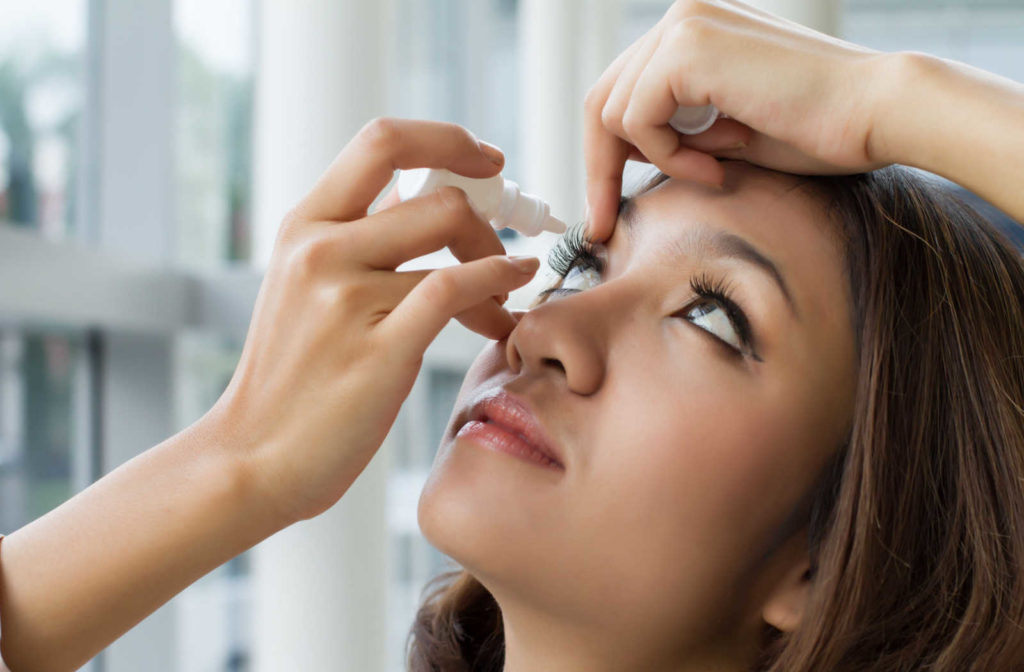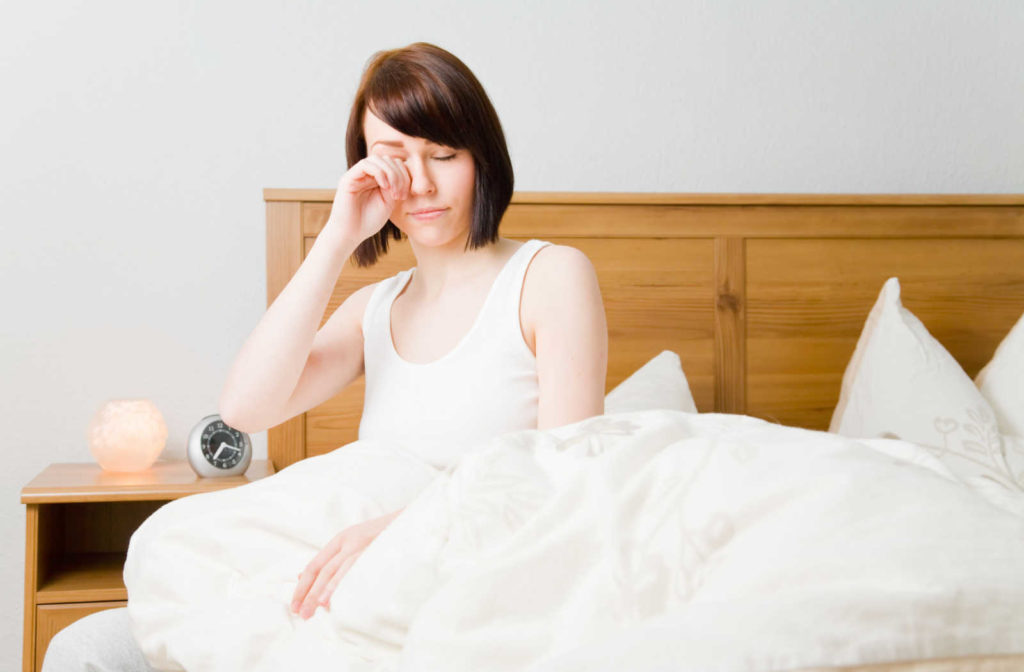If you wake up with dry eyes, you may worry and consider visiting your eye doctor. The likely cause of your discomfort is dry eye disease, a common condition. Dry eyes can lower your quality of life, making it difficult to focus or enjoy your day.
Dry eyes can affect you at any point of the day, even when you wake up. However, you can relieve dry eyes with several at-home treatments.
What Is Dry Eye?
Dry eye occurs when your tears can’t effectively hydrate your eyes, leading to discomfort. Without enough moisture, you can experience several uncomfortable symptoms, including:
- A stinging sensation in the eyes
- Light sensitivity
- Stringy mucus in or around the eyes
- Red eyes
- Blurry vision
- Eye fatigue
- Watery eyes
- Difficulty wearing contact lenses
What Causes Dry Eyes?
Dry eye develops due to issues with your tear film, 3 layers (mucus, water, and oil) that help keep your eyes clean, hydrated, and free of debris.
Problems with the tear film can lead to decreased tear production or increased tear evaporation:
- Decreased tear production: Decreased tear production occurs when your body can’t produce enough tears to keep your eyes moist. This typically happens due to age, but other factors can affect tear production.
- Increased tear evaporation: Increased tear evaporation occurs when your tear film lacks enough oil to prevent tears from drying out. Clogged meibomian glands and other factors can cause increased evaporation, leading to dry eyes.
Why Can You Wake Up with Dry Eyes?
Besides the traditional causes of dry eyes, issues with your eyelids can cause dryness when you wake up. This condition is called nocturnal lagophthalmos.
Nocturnal lagophthalmos occurs when your eyelids don’t fully close at night when you sleep. Experts believe this condition develops due to weakness in your facial nerves, which can happen due to:
- Bell’s palsy
- Injury to your arteries
- Skull or jaw injury
How Can You Relieve Dry Eyes?
Dry eyes can be more than a nuisance. You may wonder how to prevent this irritation from happening. For some patients, at-home treatments can help reduce dry eye symptoms.
There are several ways to relieve dry eyes, no matter the time of day.

Eye Drops
Lubricating eye drops can help hydrate your eyes when dry and irritated. Also called artificial tears, these products simulate your real tears and help provide temporary moisture.
You can use these eye drops as many times as you’d like, but ensure you check to see if your eye drops have preservatives.
Eye drops with preservatives last longer because of additives, preventing bacteria growth. However, these added preservatives can make dry eyes worse. You shouldn’t rely on these eye drops.
Preservative-free eye drops don’t have additives, making them not last as long. However, you can use these eye drops as many times as you want throughout the day.
Environmental Changes
Many aspects of your environment can lead to dry eyes or worsen your symptoms. You can relieve or prevent dry eyes in several ways, whether at home, work, outside, or in another public space.
Some possible ways to relieve dry eye include:
- Using a humidifier in dry environments
- Taking regular breaks and frequently blinking when using digital screens or reading
- Wearing wraparound sunglasses when it’s windy or dusty outside
- Avoiding fans or hair dryers unless necessary
Eye Gels
Eye gels can help lubricate your eyes, keeping them hydrated for long periods. While these gels are effective, they can blur your vision, making them ideal for sleeping.
You can apply this gel before you sleep and wake up with comfortable vision.
Warm Compresses
Warm compresses are clean cloths soaked in warm water—a simple but effective way to treat dry eyes at home. Besides comfort, warm compresses have several benefits for your eyes.
Warm compresses can help relieve dry eyes in several ways—they can:
- Unclog the meibomian glands, improving oil flow to the eyes
- Hydrate the eyes to help produce more tears
- Reduce swelling due to increased blood flow to the eyes
- Relieve pain
Staying Hydrated
Hydration is important for your overall health, including your eyes. Without enough water, your body struggles to produce adequate tears, leading to dry eyes.
The Canadian Association of Optometrists recommends setting a goal to drink at least 8 cups of water a day.
While staying hydrated and following other precautions can help relieve or prevent dry eyes, there’s never a guarantee. You can find the best ways to manage your dry eye situation with help from your eye doctor.
Don’t Live with Dry Eyes
Dry eyes can affect your quality of life, even making mornings difficult. However, relief is possible by working with your optometrist. After completing a comprehensive eye exam, they can recommend a customized treatment plan for your dry eye needs. Contact LMC Optometry and Eye Care if you experience dry eye symptoms.



